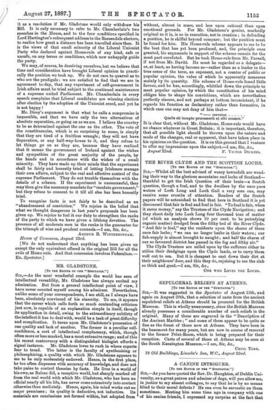MR. GLADSTONE.
[To THE EDITOR OP THE "SPECTATOR."]
Sta,—As the most wonderful example the world has seen of intellectual versatility, Mr. Gladstone has always excited my admiration. But from a general intellectual point of view, I have never counted myself among his admirers. Nevertheless, unlike some of your correspondents, I am still, as I always have been, absolutely convinced of his sincerity. To me, it appears that the career which calls forth so much contending criticism just now, is capable of an explanation simple in itself, though its application in detail, owing to the extraordinary subtlety of the intellect it has to deal with, would be a task of great difficulty and complication. It terns upon Mr. Gladstone's possession of one quality and lack of another. The former is a peculiar self- confidence, a sort of intellectual complacency, which, though often more or less masked, has a moat extensive range ; and of this his recent controversy with a distinguished biologist affords a signal instance. Mr. Gladstone loves to rush in where experts fear to tread. The latter is the faculty of synthesising or philosophising, a quality with which Mr. Gladstone appears to me to be only moderately endowed. Hence, in the first place, he too often dispenses with accuracy of knowledge, and does not take pains to control theories by facts. He lives in a world of his own, as Balzac did, a receptive world, but sharply marked off from the real world with which Mr. Gladstone, who has been an official nearly all his life, has never come extensively into contact otherwise than mediately. Hence, again, his mind works out no major promisees; its quality is deductive, not inductive. Its materials are conclusions not formed within, but adopted from without, almost in mass, and less upon rational than upon emotional grounds. For Mr. Gladstone's genius, markedly original as it is, is so in execution, not in creation ; in defending a position, he is skilful beyond compare ; but the position must be found for him. His Home-rule scheme appears to me to be the best that has yet been produced, and, the principle once granted, his arguments in support of the scheme remain for the moat part unrefuted. But he took Home-rule from Mr. Parnell, if not from Mr. Devitt. He must be regarded as a delegate— or, at least, as having become so—rather than as a leader in the true sense of the term, an exponent, not a creator of public or popular opinion, the value of which he apparently measures mainly by its quantity. His scheme of Home-rule found little favour, and he has, accordingly, whittled down the principle to meet popular opinion, by which the constitution of his mind obliges him to shape his convictions, which are nevertheless perfectly sincere, and not perhaps at bottom inconsistent, if he regards his function as declaratory rather than formative, in which case one may not deny of him that- " — servetar goalie ab incepto proceeserit et sibi oonstet."
It is clear that, without Mr. Gladstone, Home-rule would have no chance whatever in Great Britain; it is important, therefore, that all possible light should be thrown upon the nature and mode of the changes, real or apparent, that have taken place in his opinions on the question. It is on this ground that I venture to offer my impressions upon the subject.—I am, Sir, &c.,


































 Previous page
Previous page